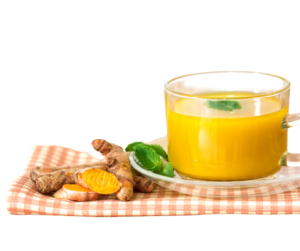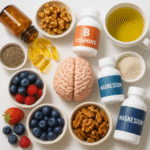Turmeric, a vibrant yellow spice frequently featured in curries and various Asian dishes, provides more than just a culinary enhancement. Its esteemed acclaim is primarily linked to its extraordinary medicinal properties, predominantly associated with its active compound, curcumin. This compound forms the basis of turmeric's extensive health advantages, establishing it as a vital component in holistic health and wellness approaches.
Explore the Rich Historical Importance of Turmeric in Traditional Medicinal Practices
For innumerable generations, turmeric has served as a fundamental ingredient in traditional Ayurvedic and Chinese medicine, revered for its vast array of health benefits. In modern times, emerging scientific research has shed light on the remarkable capabilities of turmeric in fostering a healthy lifestyle. Let us delve into the ways this golden spice can significantly elevate your overall health and wellness.
Uncover the Healing Power of Curcumin: Nature’s Potent Therapeutic Agent
Curcumin, the principal bioactive component found in turmeric, is responsible for a substantial portion of its impressive health benefits. Celebrated for its robust anti-inflammatory and antioxidant properties, curcumin has undergone extensive investigation concerning its potential therapeutic applications. Research indicates it may assist in various health conditions, spanning from chronic diseases to mental health issues. For maximising the benefits of turmeric, it is recommended to consume it alongside black pepper. The piperine present in black pepper significantly enhances the body’s capacity to absorb and make use of the beneficial compounds in turmeric. Additionally, pairing it with ginger can further amplify its health-boosting attributes.
Harnessing Antioxidants: The Protective Role of Turmeric Against Cellular Damage
Turmeric acts as a powerful antioxidant, protecting our cells from the damage caused by waste products known as free radicals. These detrimental agents are continuously produced within the body through essential processes like digestion. They resemble toxic exhaust fumes, contributing to a wide range of diseases. Furthermore, free radicals can emerge during stress and from exposure to medications, chemicals, preservatives, and pesticides. The curcumin in turmeric effectively neutralises these harmful substances, thus defending the body from illness, discomfort, and cellular damage.
Due to its extraordinary anti-inflammatory and antioxidant characteristics, curcumin has been linked to the prevention of serious health conditions such as cancer, diabetes, stroke, and heart disease. Moreover, it has also been acknowledged for its effectiveness in combating infections and alleviating various health issues, including colic in infants, menstrual discomfort, digestive challenges, bruising, jaundice, dementia, arthritis, and toothaches.
Curcumin’s Role in Cancer Prevention: Your Natural Defence Mechanism
Inhibiting Tumour Growth: Curcumin’s Potential as a Cancer Fighter
Research has shown that curcumin can hinder the growth of various types of cancer cells. It has particularly demonstrated effectiveness against breast cancer cells by altering cellular communication. Essentially, when cancer cells find it difficult to signal correctly, their replication is impeded, significantly slowing their proliferation. Additionally, curcumin induces programmed cell death, effectively targeting and eliminating cancerous cells.
Chronic inflammation is acknowledged as a precursor to cancer. Turmeric diminishes the release of enzymes that contribute to inflammatory processes, providing a plausible explanation for its cancer-preventive properties by stopping the disease before it takes hold.
Furthermore, turmeric’s cancer-preventive attributes extend to its ability to interfere with genetic expression. Specific genes are closely linked to cancer development; however, if these genes remain inactive, they remain dormant. Curcumin effectively obstructs the signalling pathways that would otherwise activate these cancer-promoting genes while simultaneously activating genes that bolster the body’s defences against cancer formation.
Preventing Metastasis: Curbing Cancer's Spread with Turmeric
Regular consumption of curcumin has been demonstrated to reduce the size of cancerous tumours by inhibiting their ability to develop a blood supply. This blood supply is critical for tumours to receive the nutrients and oxygen essential for their growth. The ability of tumours to establish this blood supply also plays a key role in the spread of cancer throughout the body. Therefore, curcumin not only reduces tumour size but also diminishes the risk of secondary cancers. Moreover, turmeric has shown effectiveness in preventing the growth of metastatic cancers by inhibiting inflammation-related chemicals that facilitate the spread of cancer. Clearly, turmeric addresses cancer prevention from multiple angles!
Curcumin has also been shown to lower the activity of a substance prevalent among women undergoing hormone replacement therapy, known as vascular epithelial growth factor. This factor is implicated in breast cancer development and the sustenance of blood supply to tumours. By inhibiting this factor, curcumin ensures that cancer cells lack the essential nourishment needed to thrive and multiply.
Enhancing Chemotherapy: Supporting Conventional Cancer Treatments with Curcumin
Standard cancer treatments such as radiotherapy and chemotherapy may effectively reduce tumour size; however, they often fail to eradicate the stem cells that lie at the core of the tumour. If these stem cells persist, the tumour is likely to regrow. Fortunately, turmeric provides a solution by inhibiting the proliferation of these stem cells. Moreover, curcumin aids in alleviating the damaging effects of conventional cancer treatments on healthy cells, thereby enhancing overall treatment outcomes.
Numerous studies have examined the synergy between curcumin and chemotherapy agents, revealing that curcumin can enhance the effectiveness of these medications. This combination has the potential to improve treatment results while minimising the side effects typically associated with chemotherapy.
Maintaining a wholesome, nutrient-rich diet is crucial during cancer treatment, and incorporating ample turmeric can significantly support this.
For optimal results in combating cancer using turmeric, consider taking it in supplement form. Turmeric supplements are specifically designed to ensure that the body can efficiently absorb and utilise the active components.
Alleviating Inflammation: The Exceptional Anti-Inflammatory Benefits of Curcumin
Inflammation is a natural immune response that leads to soreness, irritation, and infection. Nevertheless, this response is intended to be temporary; complications arise when inflammation becomes chronic, resulting in various life-threatening diseases.
The most effective method to alleviate pain and irritation is through natural approaches, and this is where turmeric excels. It is as potent as conventional medications, yet without the adverse side effects. Traditional pharmaceuticals often merely address symptoms rather than targeting the root cause. In contrast, turmeric tackles inflammation at its source by reducing the release of inflammatory chemicals. Furthermore, it prevents these chemicals from entering cells, thereby further curbing inflammation.
For optimal effectiveness, consume turmeric or curcumin supplements between meals, allowing it a clear path to work effectively in reducing inflammation. However, avoid taking them on an empty stomach, as this may lead to gut irritation.
Supporting Healthy Weight Management: The Impact of Turmeric on Obesity
Chronic inflammation is a contributing factor to obesity, which in turn elevates the risk of developing various health conditions. This creates a vicious cycle, complicating weight loss efforts. While curcumin does play a role in weight reduction, it is essential to understand that it is not a miraculous weight-loss solution. Nonetheless, studies indicate that it can reduce the size of fat cells and decrease overall fat accumulation in the body. Spices are known to enhance a process called thermogenesis, which generates heat and burns calories, partly through the activation of brown fat. Curcumin aids in converting white fat into brown fat, resulting in increased heat production and calorie burning.
Managing Arthritis Pain: The Anti-Inflammatory Qualities of Turmeric
Arthritis, a condition marked by inflammation, leads to painful joints and muscle discomfort. The anti-inflammatory attributes of turmeric, as previously discussed, render it an effective remedy for managing pain associated with arthritis. Turmeric addresses the root cause of inflammation rather than merely masking symptoms. It also alleviates stiffness, promoting improved mobility for individuals suffering from arthritic conditions.
Unfortunately, arthritis is a chronic condition. A drawback of long-term use of anti-inflammatory medications is their potential side effects, including gastrointestinal disturbances and even bleeding. In contrast, a safe dosage of turmeric provides the benefits without adverse reactions. However, it is vital to consult a healthcare professional before discontinuing any prescribed medications.
To maximise the effectiveness of turmeric for arthritic conditions, consider taking it alongside bromelain capsules. Bromelain, an enzyme found in pineapple, is known to reduce swelling. Why not incorporate turmeric into pineapple juice or add fresh pineapple to your curry for a delightful combination?
Enhancing Digestive Health: The Soothing Properties of Turmeric for Gut Wellness
Turmeric proves beneficial for addressing painful conditions affecting the large intestine, such as Crohn's disease and ulcerative colitis. Although scientific research has yet to fully elucidate the mechanisms involved, curcumin has demonstrated the ability to alleviate gut discomfort and painful ulcers by inhibiting the production of irritating chemicals.
The body tolerates turmeric significantly better than conventional medications, resulting in fewer side effects and discomfort. Even a modest amount of turmeric in food has been shown to enhance digestive health, with supplements offering additional benefits.
Turmeric can assist in alleviating indigestion by stimulating the gallbladder to produce bile, which is vital for digesting and absorbing fats.
Bile plays a crucial role in the digestion of fats and the absorption of fat-soluble vitamins. Without adequate bile, the body may experience gas and bloating, leading to discomfort. In Germany, turmeric is officially acknowledged as a natural remedy for digestive issues.
Alleviating Gas, Supporting Gut Health, and Soothing Haemorrhoids with Turmeric
If you suffer from gas, which can lead to burping and flatulence, turmeric can provide relief by promoting gut motility and facilitating food transit. This prevents gas accumulation. The compounds in turmeric also enhance nutrient absorption and promote the growth of beneficial gut bacteria, both of which help to reduce gas. The fibre content in turmeric is advantageous for maintaining healthy gut microbiota, positively impacting various bodily functions. Turmeric has historically been used to prevent and heal stomach ulcers by increasing mucus production, thus protecting the stomach lining from irritation caused by processed foods and medications.
Haemorrhoids, commonly known as piles, characterised by swollen veins in the anal area, can also benefit from turmeric treatments. It alleviates soreness, bulging, pain, and itchiness. To create a natural remedy, mix turmeric, onion juice, and mustard oil to form a paste, then apply it to the affected area.
Effective Diabetes Control: The Role of Turmeric in Regulating Blood Sugar Levels
Diabetes arises when the body struggles to manage blood sugar levels, a complex process intricately linked to inflammation. Inflammatory cytokines are produced by adipose tissue, indicating that higher body fat levels are associated with heightened inflammation. This is a simplified overview, yet turmeric can reduce the production and activity of these inflammatory cytokines. Additionally, it encourages the generation of an anti-inflammatory substance known as adiponectin.
Research indicates that turmeric is safe for individuals with type 2 diabetes to consume; however, it is advisable not to exceed 3g of fresh or powdered root daily. Turmeric can enhance insulin sensitivity, making it essential to consult a healthcare provider before using turmeric, particularly if you are undergoing insulin therapy.
Boosting Brain Function: How Turmeric Enhances Memory and Mood
Scientific studies have established that the curcumin in turmeric can stimulate brain function by encouraging the growth and proliferation of brain cells. This, in turn, enhances memory and concentration. Furthermore, curcumin has demonstrated potential in alleviating symptoms of depression, dementia, and Alzheimer’s disease. As we age, cognitive decline is prevalent; however, integrating turmeric into our diets may help prevent or slow this process. In one study, participants consuming 400mg of curcumin experienced immediate improvements in memory and attention. For sustained benefits regarding mood enhancement and cognitive function, regular intake of turmeric is advised.
Fueling Your Brain: Memory Support and Dementia Prevention Through Turmeric
Inflammation is a significant contributor to the onset of Alzheimer’s disease, yet it is not the irreversible condition it was once perceived to be. A diet rich in anti-inflammatory foods, including turmeric, can reverse this trend. Research suggests that populations in India experience lower rates of Alzheimer’s and dementia, likely due to their regular consumption of turmeric. Curcumin interferes with the formation of brain plaques associated with dementia and Alzheimer’s, and it has the potential to dissolve these plaques, possibly preventing or slowing disease progression.
Nerves are insulated by a protective layer known as myelin, which enhances signal transmission. Damage to this myelin sheath, often triggered by a protein that degrades it, is one cause of dementia. Turmeric serves a protective function by inhibiting this process, safeguarding nerve insulation from deterioration.
Moreover, turmeric boosts brain protection by facilitating the clearance of waste products that can harm brain cells. It activates genes responsible for producing protective substances, thereby enhancing brain cell immunity. Additionally, curcumin increases the immune response of brain cells by boosting the activity of specific protective cells that eliminate damaged proteins. Enjoying turmeric tea, enriched with ginger, honey, and lemon, is a delightful way to incorporate turmeric for brain health. Turmeric capsules are also available for those seeking convenience and improved absorption.
Alleviating Depression: How Turmeric Naturally Enhances Mood
Turmeric serves as a potent natural remedy for depression. A study comparing individuals taking either an antidepressant, turmeric, or a combination of both yielded promising results, indicating that curcumin can be as effective as traditional medications. The most favourable outcomes were observed when participants combined the antidepressant with curcumin.
Much of the rationale behind curcumin's efficacy in alleviating depression parallels its protective effects against Alzheimer’s disease. Individuals experiencing depression frequently display low levels of neurotransmitters—chemicals vital for mood regulation. Curcuma, another compound found in turmeric, contributes to increasing neurotransmitter levels, thereby enhancing mood. Research has indicated that consuming one to three teaspoons of turmeric daily can significantly uplift mood for those grappling with depression.
A popular method of consumption is through a creamy beverage known as “golden milk”.
To prepare it, follow these steps: 
Combine half a teaspoon of turmeric powder or grated turmeric root with a pinch of cayenne pepper, half an inch of grated ginger root, and one and a half teaspoons of honey.
Warm a cup of almond or coconut milk.
Use a small amount of the milk to create a paste with the spices, ensuring a smooth consistency.
Add the remaining milk and stir thoroughly.
Strain into a mug and enjoy up to three times a day for maximum benefits.
Promoting Cardiovascular Health: The Heart Benefits of Turmeric
Lowering Cholesterol Levels: Supporting Heart Health Naturally
Cholesterol often faces negative scrutiny, yet it plays a critical role in numerous bodily functions. Elevated cholesterol levels in the blood are significant risk factors for heart disease. Curcumin has been shown to effectively lower levels of LDL cholesterol, commonly referred to as ‘bad cholesterol'.
It achieves this by prompting liver cells to eliminate ‘bad' cholesterol from the bloodstream, which is subsequently expelled by the liver. Furthermore, curcumin inhibits a process known as oxidation, which causes cholesterol to adhere to blood vessel walls, leading to damage and potential blockages.
If fragments of these oxidised cholesterol plaques dislodge and reach the heart or brain, they can trigger a stroke or heart attack. Curcumin plays a vital role in preventing such hazardous situations from occurring. Curcumin can also elevate levels of ‘good' cholesterol, with one study indicating a nearly 30% increase after just one week of consuming 500mg of curcumin daily.
Natural Anticoagulant Properties: Preventing Blood Clots Naturally
Curcumin possesses inherent anticoagulant qualities, aiding in the prevention of blood clot formation. Blood clots can lead to severe cardiovascular events such as heart attacks and strokes, making curcumin's ability to inhibit clot formation highly beneficial for heart health.
Maintaining Cardiovascular Integrity: Turmeric’s Protective Benefits for Blood Vessels
Curcumin enhances and protects the functionality of the heart and blood vessels. It safeguards the endothelial lining of blood vessels from inflammatory damage, making it easier for the body to repair injuries when they occur. Remarkably, curcumin’s protective properties are comparable to those of atorvastatin, a commonly prescribed medication for heart health. Additionally, homocysteine, a substance that can damage blood vessel walls when elevated, is mitigated by turmeric’s high vitamin B6 content, which helps prevent homocysteine levels from rising. A study revealed that individuals taking 4g of curcumin daily had a 65% lower risk of experiencing a heart attack.
Reaping Anti-Aging Benefits: How Turmeric Promotes Youthfulness
Aging is a natural process; however, lifestyle choices can accelerate its effects. Factors such as diet, smoking, excessive alcohol consumption, air pollution, and unprotected sun exposure can hasten the signs of aging. Consuming foods rich in antioxidants can counteract these effects, and turmeric is a powerhouse of antioxidants. Turmeric has been demonstrated to prevent oxidation, which causes damage to skin cells and contributes to visible aging signs, such as wrinkles and sagging skin. Consequently, turmeric can play a vital role in maintaining a youthful appearance.
Regular consumption of turmeric can also provide protection against UV damage caused by sun exposure, thanks to its anti-inflammatory properties. Furthermore, curcumin has shown the ability to repair DNA that has been damaged by sunburn. In the same manner that curcumin protects against cancer, it can also shield the skin from skin cancers resulting from excessive sun exposure.
Incorporating Culinary Versatility: How to Seamlessly Add Turmeric to Your Diet
With its warm, peppery flavour and vibrant golden hue, turmeric is a beloved ingredient in Indian cuisine, particularly in curries. However, its applications extend far beyond this, as its popularity and accessibility continue to grow globally due to its numerous health benefits.
To fully harness the benefits of turmeric, it can be effortlessly integrated into a wide variety of foods and recipes. It pairs beautifully with meat and fish dishes, soups, stews, and, of course, curries. Moreover, it can be brewed into a refreshing tea or blended into smoothies and juices. To enhance your health, sprinkle turmeric on vegetables, mix it into dressings and dips, or incorporate it with yogurt or mayonnaise for a delightful flavour infusion.

When purchasing turmeric, choose reputable suppliers to ensure organic quality. The benefits of turmeric stem from its nutrient-rich compounds, including dietary fibre, manganese, potassium, iron, copper, and vitamin B6.
Turmeric is available in various forms, including root, powder, essential oil, and supplements.
Important Precautions and Considerations: Safely Maximising the Benefits of Turmeric
Children should avoid turmeric supplements. However, adults can safely consume turmeric supplements when following specific guidelines. If you are on diabetes medication, it is essential to consult a healthcare professional, as turmeric can lower blood sugar levels. Always adhere to the recommended dosage, as excessive consumption may lead to gastrointestinal discomfort, nausea, and diarrhoea. Prolonged overuse can even result in painful stomach ulcers. Pregnant or nursing women should avoid turmeric supplements. If surgery is on the horizon, it is advisable to cease using turmeric supplements.
With these precautions in mind, turmeric is a vital addition to your diet for maintaining health and wellness.
Curcumin Supplements: Your Gateway to Enhanced Health Benefits
When selecting curcumin supplements, opt for reputable brands that source their products from natural food sources rather than synthetic chemicals. As a nutritionist and practitioner, I recommend Biocare and Cytoplan in the UK. For a 10% discount, feel free to reach out to me, and I will gladly share the code.
Prefer Auditory Learning?
References: Delve Deeper into Turmeric’s Health Benefits
Role of Turmeric and Curcumin in Prevention and Treatment of Chronic Diseases
The Article: Health Benefits of Turmeric: Nature’s Golden Spice for a Healthy Lifestyle appeared first on https://janestevensnutrition.com
The Article: Turmeric: Nature’s Golden Spice for Health Benefits appeared first on https://janestevens.net
The Article Turmeric: The Golden Spice for Health Advantages Was Found On https://limitsofstrategy.com

